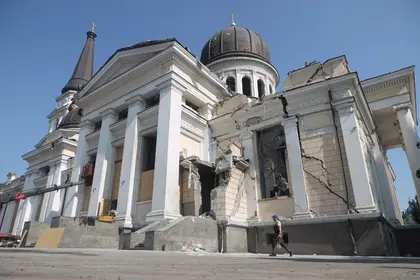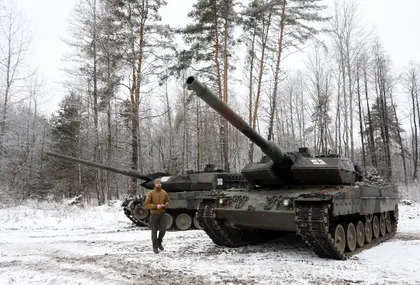In the ongoing war that has ravaged Ukraine, the country’s cultural heritage has not escaped unscathed. The destruction wrought upon historical sites, museums, and archives is not merely collateral damage – it is an erasure of national identity, an attempt to obliterate the cultural memory that binds the Ukrainian people. It is clear that safeguarding this heritage is as critical as defending the nation’s people, their sovereignty and memory.
The Armed Forces of Ukraine (AFU), already an exemplar of resilience, could pioneer an innovative approach by forming a dedicated unit of professional heritage experts tasked with the protection, documentation, and restoration of the nation’s cultural treasures.
JOIN US ON TELEGRAM
Follow our coverage of the war on the @Kyivpost_official.
The need for such a unit is evident. Ukraine’s rich tapestry of history is under siege, with each damaged artifact, each demolished monument, and each looted work of art diminishing the collective spirit of the nation.
In the face of this cultural calamity, Ukraine has the unique opportunity to draw from the pool of heritage professionals who have already joined the ranks of its armed forces as the conflict escalated. Archaeologists, historians, and art experts have taken up arms to defend their country. Now, they should be afforded the chance to wield their expertise as their weapon of choice in a different kind of battle – a battle for Ukraine’s soul.

Ukraine’s Navy Shoots Down Russian Missile – A New Air Defense Strategy?
In a recent interview for Ukrainska Pravda, the director of the National Museum of the History of Ukraine, Dr. Fedir Androshchuk pointed out that “such a precedent already exists. For example, in NATO forces, there are specially trained units focused on cultural heritage. Obviously, it is important to realize that this is a strategically important issue for the state, around which the identity of the state, the territory, and the like are built.” In this regard, Ukraine is even better positioned to implement such an arrangement, it has actual heritage professionals as serving soldiers.
The Ukrainian military, more than any other institution, is ideally positioned to facilitate this critical mission. With an established logistical framework and the legal mandate to operate immediately within conflict zones, the army can provide its experts with the access and tools necessary to carry out their work. By incorporating heritage preservation into military operations, these professionals can swiftly assess damage, secure at-risk sites, and begin the meticulous work of documentation – essential steps for holding perpetrators accountable in international courts, including the International Criminal Court (ICC), and for substantiating claims for reparations.
The international legal context is propitious for such an initiative. The destruction of cultural heritage is a violation of international law, as per the Rome Statute of the International Criminal Court and the 1954 Hague Convention. A dedicated military heritage unit could serve as the eyes and ears of the global legal community, meticulously recording each act of destruction for future prosecutions and claims for compensation.
While the armed forces have already began collaborations with the US and other partners in training personnel in dealing with the violations of the Hague Conventions, it has yet to utilize its own resources in doing so, and time is of the essence, as evidence fades and proof of crimes committed by Russian forces becomes harder to adequately document.
Incorporating heritage recording into the Ukrainian military’s existing framework offers a swift and fiscally responsible solution. Such integration ensures that the essential documentation of cultural losses does not require immediate substantial funding and can begin without delay, tapping into the army’s existing logistical and legal capacities.
Facilitating reparations
The prompt action of the army in this realm not only accelerates the preservation efforts but is also pivotal for reparation endeavors. As the military secures detailed records of damaged, destroyed, and stolen heritage, these documents become invaluable in international courts, potentially leading to reparations that could substantially fund restoration, thereby reducing the financial onus on Ukraine’s allies.
Moreover, the establishment of a Ukrainian military heritage unit would send a powerful message of defiance against attempts to undermine the nation’s sovereignty and identity. It would be a declaration that Ukraine does not yield its past, present, or future. In the face of a conflict that seeks to dismantle the narrative of a people, the preservation of cultural heritage becomes an act of resistance. It is a reaffirmation of the enduring spirit of Ukraine and its unyielding connection to its history and traditions.
By committing to the safeguarding and restoration of its cultural heritage, Ukraine is not only protecting its past but also securing the foundations for its future. The state’s cultural patrimony serves as a beacon of national identity, a source of resilience and unity for a people in the face of unimaginable adversity and its adequate recording and preservation in these testing times would ensure that the nation’s cultural heritage is not relegated to memory, but is preserved for future generations to experience and cherish, but acting as a promise and reminder to the world that Ukraine’s cultural identity will endure long after the guns have fallen silent.
The views expressed in this opinion article are the author’s and not necessarily those of Kyiv Post.
You can also highlight the text and press Ctrl + Enter










